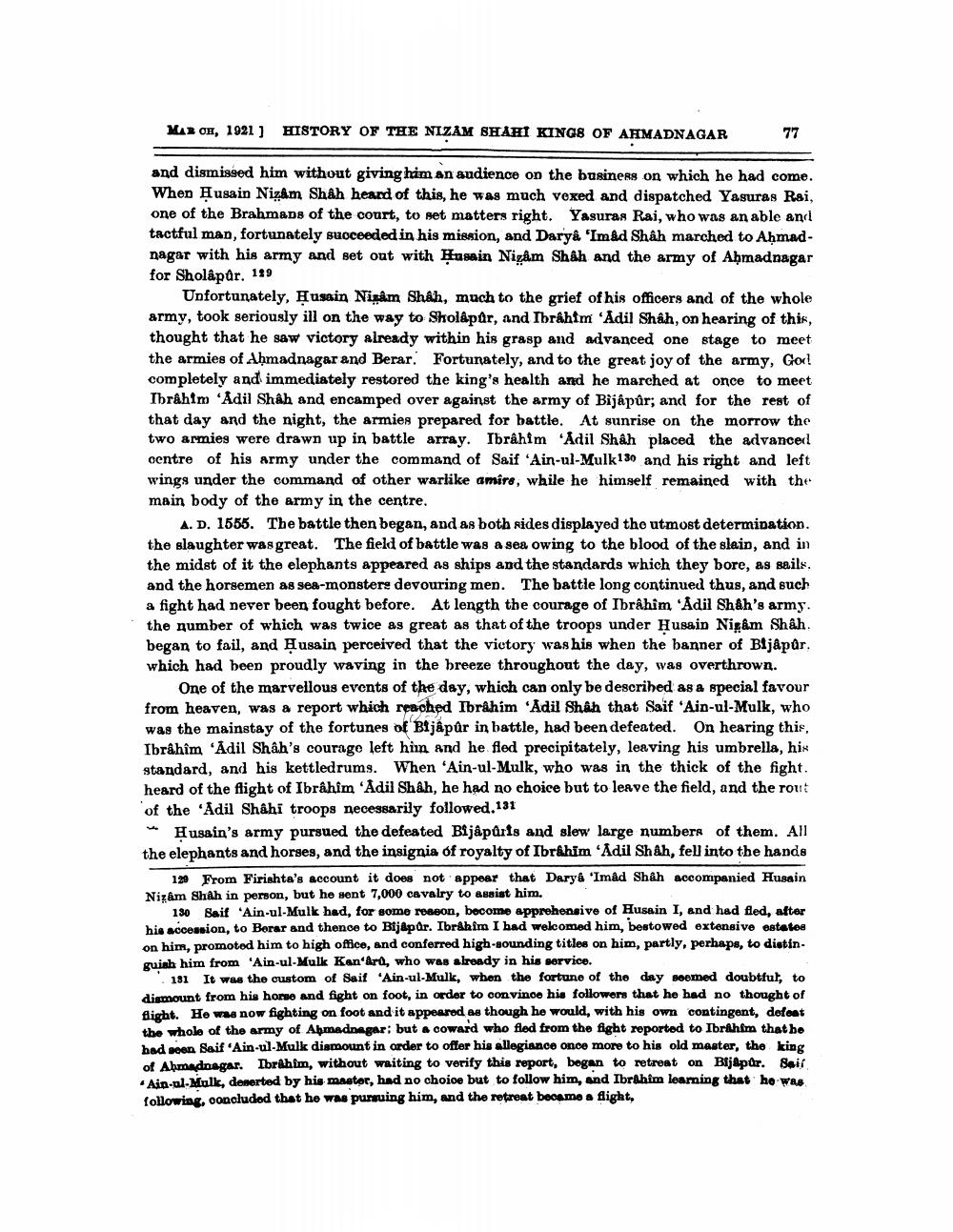________________
MARCH, 1921] HISTORY OF THE NIZAM SHAHI KINGS OF AHMADNAGAR
77
and dismissed him without giving him an audience on the business on which he had come. When Husain Nizam Shah heard of this, he was much vexed and dispatched Yasuras Rai, one of the Brahmaps of the court, to get matters right. Yasurag Rai, who was an able anci tactful man, fortunately suoceeded in his mission, and Darya 'Imad Shâh marched to Ahmadnagar with his army and set out with Husain Nizam Shah and the army of Ahmadnagar for Sholapar. 199
Unfortunately, usain Nişam Shah, much to the grief of his officers and of the whole army, took seriously ill on the way to Sholapur, and Ibrahim Adil Shah, on hearing of this, thought that he saw victory already within his grasp and advanced one stage to meet the armies of Ahmadnagar and Berar. Fortunately, and to the great joy of the army, Go! completely and immediately restored the king's health and he marched at once to meet Ibrahim 'Adil Shah and encamped over against the army of Bijapûr; and for the rest of that day and the night, the armies prepared for battle. At sunrise on the morrow the two armies were drawn up in battle array. Ibråhim 'Adil Shah placed the advance! centre of his army under the command of Saif 'Ain-ul-Mulk 130 and his right and left wings under the command of other warlike amirs, while he himself remained with the main body of the army in the centre,
A. D. 1555. The battle then began, and as both sides displayed the utmost determination. the slaughter was great. The field of battle was a sea owing to the blood of the slain, and in the midst of it the elephants appeared as ships and the standards which they bore, as sails. and the horsemen as sea-monsters devouring men. The battle long continued thus, and such a fight had never been fought before. At length the courage of Ibrahim 'Adil Shah's army. the number of which was twice as great as that of the troops under Husain Nigam Shah. began to fail, and usain perceived that the victory was his when the banner of Bijapur. which had been proudly waving in the breeze throughout the day, was overthrown.
One of the marvellous events of the day, which can only be described as a special favour from heaven, was a report which reached Ibråhim 'Adil Shah that Saif 'Ain-ul-Mulk, who was the mainstay of the fortunes of Bijapur in battle, had been defeated. On hearing this, Ibrahim Adil Shah's courage left him and he fled precipitately, leaving his umbrella, his standard, and his kettledrums. When 'Ain-ul-Mulk, who was in the thick of the fight. heard of the flight of Ibrahim Adil Shah, he had no choice but to leave the field, and the rout of the 'Adil Shâhi troops necessarily followed. 131
Husain's army pursued the defeated Bijapuris and slew large numbers of them. All the elephants and horses, and the insignia of royalty of Ibråhim 'Adil Shah, fell into the hands
129 From Firishta's account it does not appear that Darya 'Imad Shah accompanied Husain Nizam Shah in person, but he sent 7,000 cavalry to assist him.
130 Saif 'Ain-ul-Mulk had, for some reason, become apprehensive of Husain I, and had fled, after his accession, to Borar and thence to Bijepar. Ibrahim I had welcomed him, bestowed extensive estates on him, promoted him to high office, and conferred high-sounding titles on him, partly, perhaps, to distin. guinh him from 'Ain-ul-Mulk Kan'&rd, who was already in his service.
181 It was the custom of Saif 'Ain-ul-Mulk, when the fortune of the day soomed doubtful, to di mount from his horse and fight on foot, in order to convince his followers that he had no thought of flight. He was now fighting on foot and it appeared as though he would, with his own contingent, defeat the whole of the army of Ahmadnagar: but & coward who fled from the fight reported to Ibrahim that be bad soen Saif Ain-ul-Mulk dismount in order to offer his allegiance once more to his old master, the king of Ahmednagar. Ibrahim, without waiting to verify this report, bogan to retreat on Bijapur. Sair • Ain-ul. Mulk, donorted by his master, had no choice but to follow him, and Ibrahim learning that he was following, concluded that he was pursuing him, and the retreat became a flight,




